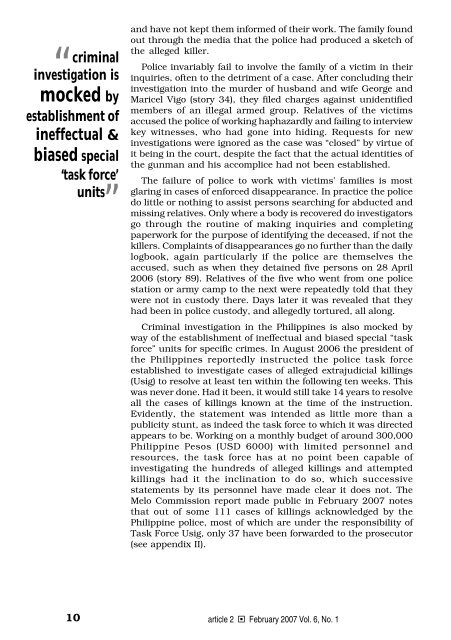of the Philippines the criminal justice system is - Article 2
of the Philippines the criminal justice system is - Article 2
of the Philippines the criminal justice system is - Article 2
You also want an ePaper? Increase the reach of your titles
YUMPU automatically turns print PDFs into web optimized ePapers that Google loves.
<strong>criminal</strong><br />
investigation <strong>is</strong><br />
mocked by<br />
establ<strong>is</strong>hment <strong>of</strong><br />
ineffectual &<br />
biased special<br />
‘task force’<br />
units....<br />
“<br />
”<br />
and have not kept <strong>the</strong>m informed <strong>of</strong> <strong>the</strong>ir work. The family found<br />
out through <strong>the</strong> media that <strong>the</strong> police had produced a sketch <strong>of</strong><br />
<strong>the</strong> alleged killer.<br />
Police invariably fail to involve <strong>the</strong> family <strong>of</strong> a victim in <strong>the</strong>ir<br />
inquiries, <strong>of</strong>ten to <strong>the</strong> detriment <strong>of</strong> a case. After concluding <strong>the</strong>ir<br />
investigation into <strong>the</strong> murder <strong>of</strong> husband and wife George and<br />
Maricel Vigo (story 34), <strong>the</strong>y filed charges against unidentified<br />
members <strong>of</strong> an illegal armed group. Relatives <strong>of</strong> <strong>the</strong> victims<br />
accused <strong>the</strong> police <strong>of</strong> working haphazardly and failing to interview<br />
key witnesses, who had gone into hiding. Requests for new<br />
investigations were ignored as <strong>the</strong> case was “closed” by virtue <strong>of</strong><br />
it being in <strong>the</strong> court, despite <strong>the</strong> fact that <strong>the</strong> actual identities <strong>of</strong><br />
<strong>the</strong> gunman and h<strong>is</strong> accomplice had not been establ<strong>is</strong>hed.<br />
The failure <strong>of</strong> police to work with victims’ families <strong>is</strong> most<br />
glaring in cases <strong>of</strong> enforced d<strong>is</strong>appearance. In practice <strong>the</strong> police<br />
do little or nothing to ass<strong>is</strong>t persons searching for abducted and<br />
m<strong>is</strong>sing relatives. Only where a body <strong>is</strong> recovered do investigators<br />
go through <strong>the</strong> routine <strong>of</strong> making inquiries and completing<br />
paperwork for <strong>the</strong> purpose <strong>of</strong> identifying <strong>the</strong> deceased, if not <strong>the</strong><br />
killers. Complaints <strong>of</strong> d<strong>is</strong>appearances go no fur<strong>the</strong>r than <strong>the</strong> daily<br />
logbook, again particularly if <strong>the</strong> police are <strong>the</strong>mselves <strong>the</strong><br />
accused, such as when <strong>the</strong>y detained five persons on 28 April<br />
2006 (story 89). Relatives <strong>of</strong> <strong>the</strong> five who went from one police<br />
station or army camp to <strong>the</strong> next were repeatedly told that <strong>the</strong>y<br />
were not in custody <strong>the</strong>re. Days later it was revealed that <strong>the</strong>y<br />
had been in police custody, and allegedly tortured, all along.<br />
Criminal investigation in <strong>the</strong> <strong>Philippines</strong> <strong>is</strong> also mocked by<br />
way <strong>of</strong> <strong>the</strong> establ<strong>is</strong>hment <strong>of</strong> ineffectual and biased special “task<br />
force” units for specific crimes. In August 2006 <strong>the</strong> president <strong>of</strong><br />
<strong>the</strong> <strong>Philippines</strong> reportedly instructed <strong>the</strong> police task force<br />
establ<strong>is</strong>hed to investigate cases <strong>of</strong> alleged extrajudicial killings<br />
(Usig) to resolve at least ten within <strong>the</strong> following ten weeks. Th<strong>is</strong><br />
was never done. Had it been, it would still take 14 years to resolve<br />
all <strong>the</strong> cases <strong>of</strong> killings known at <strong>the</strong> time <strong>of</strong> <strong>the</strong> instruction.<br />
Evidently, <strong>the</strong> statement was intended as little more than a<br />
publicity stunt, as indeed <strong>the</strong> task force to which it was directed<br />
appears to be. Working on a monthly budget <strong>of</strong> around 300,000<br />
Philippine Pesos (USD 6000) with limited personnel and<br />
resources, <strong>the</strong> task force has at no point been capable <strong>of</strong><br />
investigating <strong>the</strong> hundreds <strong>of</strong> alleged killings and attempted<br />
killings had it <strong>the</strong> inclination to do so, which successive<br />
statements by its personnel have made clear it does not. The<br />
Melo Comm<strong>is</strong>sion report made public in February 2007 notes<br />
that out <strong>of</strong> some 111 cases <strong>of</strong> killings acknowledged by <strong>the</strong><br />
Philippine police, most <strong>of</strong> which are under <strong>the</strong> responsibility <strong>of</strong><br />
Task Force Usig, only 37 have been forwarded to <strong>the</strong> prosecutor<br />
(see appendix II).<br />
10<br />
article 2 • February 2007 Vol. 6, No. 1

















